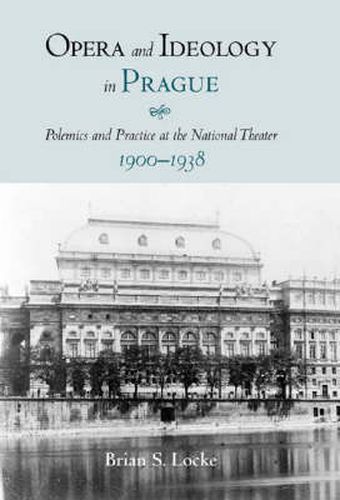Readings Newsletter
Become a Readings Member to make your shopping experience even easier.
Sign in or sign up for free!
You’re not far away from qualifying for FREE standard shipping within Australia
You’ve qualified for FREE standard shipping within Australia
The cart is loading…






This study presents a history and analysis of the Prague musical community from 1900 until the end of democracy in 1938. Opera and Ideology in Prague not only narrates the fascinating history of a local musical community but also reveals much about music and culture in Europe.
The fin-de-siecle period was dominated by the musicologist Zdenek Nejedly’s polemics regarding the competing legacies of Smetana and Dvorak and the merits of modernism.After Czech independence in 1918, a new generation of musicians accepted modernist foreign influences only with extreme hesitation.
The 1926 Prague premiere of Berg’s opera Wozzeck and the ascendancy of a young groupof avant-garde composers changed the cultural climate entirely, providing new ground for the exploration of jazz, neo-classicism, quarter tones, and socialist music. As the Czechoslovak Republic drew to a close, a resurgence of nationalism appeared in the musical expressions of both Czechs and German-Bohemians.
The analyses of operas and tone poems by Novak, Ostrcil, Zich, Jeremias, Haba, Kricka, and Suk provide a cross-section of musical life in early twentieth-century Prague, as well as a series of interpretations of Czech cultural identity. Populist endeavors such as jazz and neo-classicism represented some of the ways in which composers of the 1930s attempted to regain anaudience alienated by modernism: in this respect, the trends in Prague mirrored those of the rest of Europe.
Brian Locke is Assistant Professor of Music History at Western Illinois University, Macomb. He has written extensively on twentieth-century music, including Czech operatic and symphonic works and Alban Berg’s Wozzeck.
$9.00 standard shipping within Australia
FREE standard shipping within Australia for orders over $100.00
Express & International shipping calculated at checkout
This study presents a history and analysis of the Prague musical community from 1900 until the end of democracy in 1938. Opera and Ideology in Prague not only narrates the fascinating history of a local musical community but also reveals much about music and culture in Europe.
The fin-de-siecle period was dominated by the musicologist Zdenek Nejedly’s polemics regarding the competing legacies of Smetana and Dvorak and the merits of modernism.After Czech independence in 1918, a new generation of musicians accepted modernist foreign influences only with extreme hesitation.
The 1926 Prague premiere of Berg’s opera Wozzeck and the ascendancy of a young groupof avant-garde composers changed the cultural climate entirely, providing new ground for the exploration of jazz, neo-classicism, quarter tones, and socialist music. As the Czechoslovak Republic drew to a close, a resurgence of nationalism appeared in the musical expressions of both Czechs and German-Bohemians.
The analyses of operas and tone poems by Novak, Ostrcil, Zich, Jeremias, Haba, Kricka, and Suk provide a cross-section of musical life in early twentieth-century Prague, as well as a series of interpretations of Czech cultural identity. Populist endeavors such as jazz and neo-classicism represented some of the ways in which composers of the 1930s attempted to regain anaudience alienated by modernism: in this respect, the trends in Prague mirrored those of the rest of Europe.
Brian Locke is Assistant Professor of Music History at Western Illinois University, Macomb. He has written extensively on twentieth-century music, including Czech operatic and symphonic works and Alban Berg’s Wozzeck.